#But this is serious academic dispute requiring an in-depth knowledge of the subject I do not possess and yet I cannot let it stand
Explore tagged Tumblr posts
Text
I'm going to have to stop listening to In Our Time in the mornings, I'm just lucky my neighbours were out or I might have had to explain that the reason they heard a VERY loud shriek at 11AM was simply because I couldn't contain my reaction to something somebody said about Weber's Protestant Ethic
#Not even an area I know much about by the way#I was listening to the In Our Time episode as introductory material#But when I'm meant to be getting on with my work I launched onto JSTOR in a fury looking for articles that will support me#God I knew it was a controversial work but I had no idea just how easily it would make me unhinged#This is worse than when I used to listen to Today in Parliament in the mornings#At least then I only needed common sense to dispute whatever shite the Tory backbenchers were pouring forth#But this is serious academic dispute requiring an in-depth knowledge of the subject I do not possess and yet I cannot let it stand#Have genuinely had to pause the episode and take myself off to make tea but I'm still fuming by the kettle#Because it's an episode from like nine years ago and also a radio show not a lecture it also means#I can't just be all 'Explain yourself Sir!!!' (Sir being gender neutral and said with all the fury of an 18th century gent about to duel)#So all I can do is whine about it on tumblr and be completely distracted from the day's tasks#It was so much easier when I had the Ashes to listen to last week
5 notes
·
View notes
Text
on: Deep Work by Cal Newport
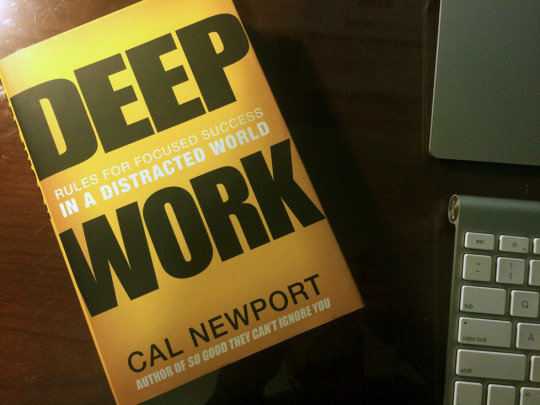
Cal Newport’s Deep Work is a triumph of self help. It embodies the qualities that make self improvement of the 21st century so great: driven by a desire to stand out from new age milieu and impractical horseshit, Newport pushes beyond the theories of Gladwell and idealism of Tim Ferriss to understand productivity. Newport’s an academic; an MIT educated professor of CompSci at Georgetown and he approaches his subject accordingly. Who gets shit done? How and why do they do it? And how does a beginner follow suit?
The central and opening argument of Deep Work is that the only way to ensure personal prosperity in an increasingly automated economy is to deliver quality knowledge work. Economic advantages aside, valuable knowledge work is a fulfilling pursuit for an individual and a way to ensure a deep love for one’s own career.
**DEEP WORK **is serious-ass knowledge work that requires at least 90 minutes of unbroken focus to get into. Expertise and experience are required.
Once his thesis is established, Newport goes to incredible depths to provide a pragmatic structure for a life of Deep Work.
major personal takeaways:
Three types of deep work: monastic seclusion (Jung), bimodal (on/off every semester), rhythmic (daily habits enforced by a desire for continuity, but less predictable). There’s also the seemingly fantastic “journalistic” mode, in which one can enter deep work at a moment’s notice.
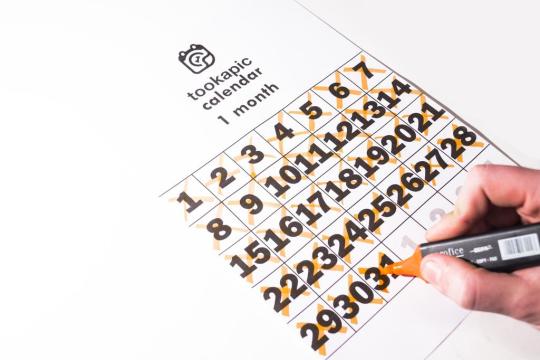
Strategy for rhythmic philosophy: “chain method.” Mark an X on your calendar for every DEEP WORK day. You will want to continue the Xs. Newport tallys his deep work hours. > Image via Attribution Engine. Licensed under CC0.
Misc tips: Have a standard daily starting time for your deep work. Make grand gestures (Rowling rented a swanky ass hotel to finish HP7).
Don’t work alone. Selective collaboration is essential to breakthrough (see: adjacent positive breakthroughs). MIT had famous building that was accidental mishmash of depts. Caused breakthroughs. Shared common space for occasional interaction is far superior to open office plan.
5. 4DX business execution method:
Focus on important stuff (pareto principal).
Act on leads, not lag.
Keep score (i.e. calendar or hour tally).
Weekly review, meetings on deep work.
RITUALIZE (obvi). Major Ferriss and many before him have popularized the importance of ritual. Think like an artist, work like an accountant:
WHEN/WHERE: Repeated locations and time frames.
Consistent “how you’ll work.” Use _freedom _app or pomodoro method. Cognitive enhancement routine included here.
Supplementation and support: methods for gathering materials, organizing work, structure of work.
Maximize Downtime. Idleness is a plus. But don’t be bored (dissatisfied with the present). Learn to live without distraction. This goes beyond mindfulness IMO. It’s about being inactive. But you don’t have to be thrilled or totally immersed in the moment. An elusive restfulness.
Replace distractions with focused work, then instead of distracting yourself, take breaks from focus. Idleness is vital for subconscious mind...
Productive meditation: take daily breaks to occupy body, but not mind. Focus on a specific problem. A walk in nature is much better than one in the city. Here’s how to PM:
Review variables (what am I working with?)
What are the next step questions?
Consolidate gains.
Repeat.
The important thing is to avoid loops. Direct your unconscious mind into new territory.

Learn to focus. Complex brain exercises are essential to laying down the deep work neurons. Newport recommends strategies for quick memorization of a deck of cards. After three days of practice, I’m able to memorize a deck in about 8 minutes. This was so fucking exciting. It reminded me off the deep cognitive joy I felt doing hard maths as a child and high school student. Other focus exercises I’ve tried or am trying: rubik’s cube (literally a one day skill), number and name memorization, chess. > Image by Israel Garcia via Attribution Engine. Licensed under CC0.
Internet blocks.
1. No social media is a big one. I figured it out a couple of years ago but was a bit angsty in my reasoning. Turns out that the numbers add up: facebook doesn’t really make your life better. There’s the _any benefit fallacy _in which users argue for one great benefit ignoring the interminable downsides. (ie “I can stay in touch with my cousins!”)
Have an internet Sabbath. I’m trying for saturdays.
Internet block periods during the day. An app can work, but a notepad is better as it will push for internal impulse control. Schedule your next 20 minutes of internet time. When you need to do research during your work, write down the topic and move on. When it’s time for the web, maximize it and get back to your offline mode ASAP.
DRAIN THE SHALLOWS. The term deep work refers to the alternative of the concept of “the shallows,” the space where our short attention spans play and stretch. Reading the NYT? Stop. Just cause its good journalism doesn’t mean it’s good for you. SAD!
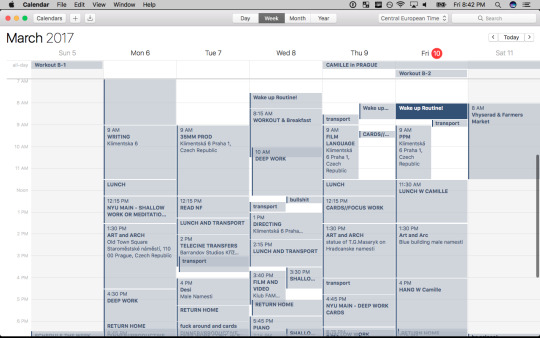
Schedule your whole day. Your whole fucking day. I’m using gCal but Newport recommends a pen and paper strategy: > 1. Write your hours down the left column, skipping lines.
Schedule blocks no smaller than 30 minutes for routines, shallow work, deep work, breaks, etc. Batch shallow work and logistics together in “task blocks.”
Schedule disputed? Cross out your earlier blocks and move over a column, scheduling the rest of your day.
Conditional overflow blocks can be used for tasks whose length you have trouble predicting. If this, then that.
Quantify activity depth. Know the value of the work your doing. Could a college grad learn to do this in a month or two? Yes? Then it’s shallow work. Deep work requires several months or years of experience and expertise.
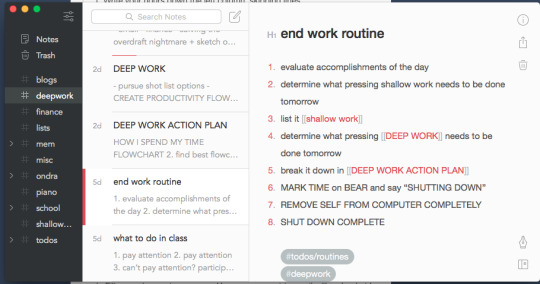
**SHUT DOWN PROPERLY. **Have a shutting down routine and shoot for the same time everyday. Respect then end of your workday. You work 9-5. Not more, not less.
big one here, dealing with email. Make people who contact you do more work. Filter senders, not messages. Use process centric emails: “here’s what I am going to do, here’s what I want you to do, here’s how you’ll do it, how you contact me, and our next steps together.” Provide dates and times for meetings and don’t waste time or energy sending endless confirmations and thank yous.
There’s so much great actionable content in this book. I hope I’ll get around to listing more. I’ve also noted some of my own personal strategies when it comes to fostering deep work.
@ottomanbob’s tips:
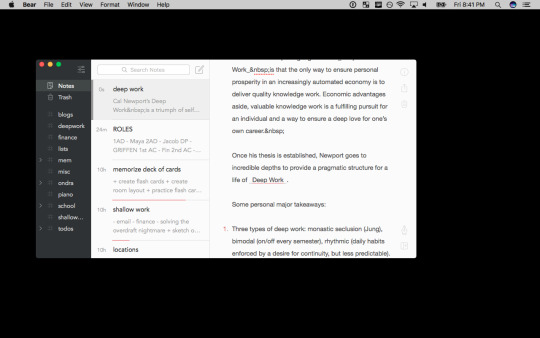
**ORGANIZE YOUR DIGITAL LIFE. **KonMari that shit. Folders and deletions are as cleansing as pitching trash bags full of clothes. Use a black wallpaper or camouflage to hide your desktop icons.
2. **BEAR **is the greatest fucking program ever for note taking on OSX. It uses markdown and has a great minimal interface. Took a couple weeks to get the hang of it but holy shit. You can link notes together, create todos and routines, work on prose writing, etc. Blow google docs out of the water.
Monastic mornings. Ferriss and Newport argue for twice-daily email checks. I say, in addition to this, don’t even touch communication software and devices till 10 or 11 am, later if you can.

**MINIMALIST WORKSPACE. **Unless you’re in vizarts, you probably don’t need anything but a notebook and laptop on your desk. Newport advocates for expensive notebooks, so you’re more intentional with your pages. > Image via Attribution Engine. Licensed under CC0.
conclusion
Always hope to add more. Thank you Cal Newport. Your book changed my life.
xx
adam
#calnewport#cal newport#deepwork#so good they can't ignore you#productivity#tim ferriss#ferriss#fourhourworkweek
0 notes